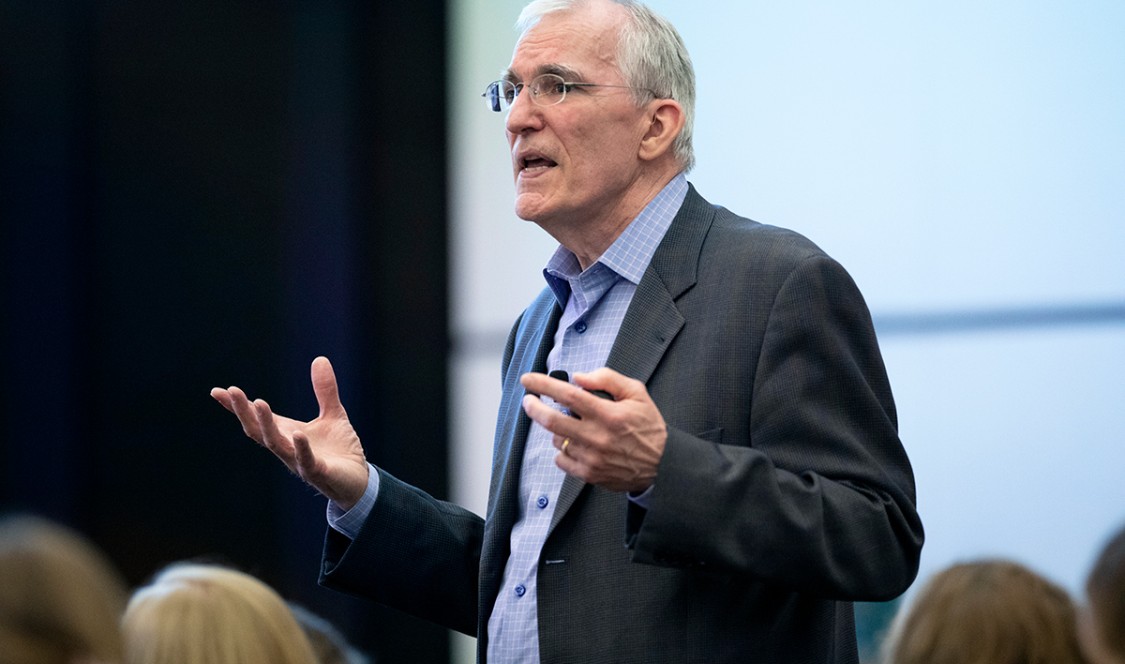Paul Beninger ’73 P’09 recalls the haunting chant of gay rights activists outside Food and Drug Administration (FDA) headquarters in Washington, D.C., during the early years of the HIV/AIDS crisis.
“Give us the drugs,” the activists implored during a protest outside the FDA, where Beninger began his career in 1987 working in drug development.
“We’re dying,” he recalls them chanting.
But at the time, there were no drugs in the pipeline to stem the tide of deaths linked to HIV/AIDS, which by 1987 has claimed the lives of more than 50,000, according to the Centers for Disease Control and Prevention.
Despite the introduction that same year of AZT as the first anti-viral drug to treat HIV, it wasn’t until 1995 when the first of a new class of drugs called protease inhibitors changed the picture of how HIV would be treated as a chronic disease.
In his 45-minute presentation Sept. 18 at the Marian Miner Cook Athenaeum, Beninger discussed being on the front lines of the rush to find a cure for HIV/AIDS, a disease for which there still is no vaccine.
During his talk, “Saving Magic Johnson: The Long and Complicated Race for Cures,” Beninger detailed how HIV/AIDS transformed the way the FDA and other federal agencies review and approve drugs.
“Now, things are happening much faster,” said Beninger, who studied mathematics, biology, and psychology at CMC. “It (the AIDS crisis) changed how the FDA reacted – it was no longer a lumbering Leviathan.”
In addition to touching on such HIV/AIDS milestones as basketball icon Magic Johnson announcing his diagnosis with the virus in 1991, Beninger told personal stories about his career at the FDA, in the private sector, as an academic, and as a family man.
Since 2017, Beninger has worked full time as an associate professor of Public Health & Community Medicine at Tufts University, where he also directs the MD/MBA and MBS/MBA programs.
Beninger recalled early on in his career facing an “existential” moment when, married with a young daughter and another on the way, he lost a fellowship in academic medicine in San Diego after the person who hired him died unexpectedly, and the replacement didn’t get along with him.
Beninger came across a job in drug development at the Food and Drug Administration, and got it.
“I didn’t even know what the FDA did,” said Beninger, who had to uproot his family to Maryland from San Diego to begin his career at the agency.
Beninger led the FDA, which today oversees 25 percent of total U.S. consumer spending ($2 trillion) and employs more than 17,000, to join Merck & Co.
At Merck, he developed experience in regulatory affairs, medical affairs, and drug safety in the areas of anti-infective drug and biological products, vaccines, anti-diabetic drug products, and oncology drug products. In 2006, he joined the biotechnology company Genzyme as vice president of pharmacovigilance, and worked there until 2017.
Makenna Mahrer ’23, a prospective pre-med student at CMC, said she was eager to attend a talk tailored to her interests.
“I was excited to hear insights into the HIV crisis from someone so closely involved,” Mahrer said after Beninger’s presentation.
Mahrer said Beninger’s talk was a a lesson in accepting setbacks.
“More than anything, Mr. Beninger showed me that no matter how much knowledge you attain, the ability to communicate it to others in an effective and productive way is what will truly help you move forward and be successful,” she said.
— Greg Hardesty

